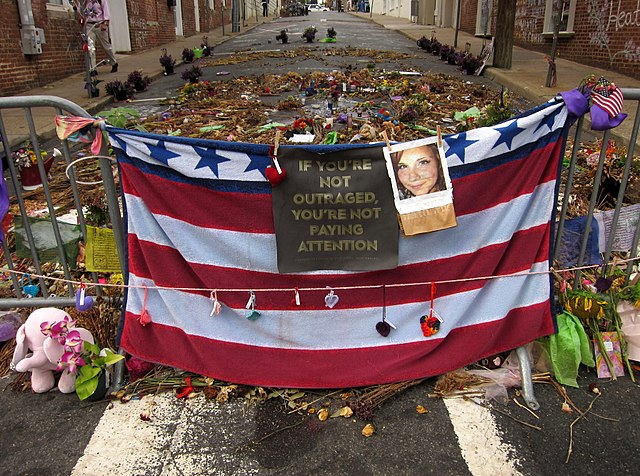White Nationalism
Ignite the Right Rally

AgnosticPreachersKid, CC BY-SA 4.0 <https://creativecommons.org/licenses/by-sa/4.0>, via Wikimedia Commons
The Patriot Front
After the Charlottesville rally, a popular group called the Patriot Front formed, which still posts regularly in alt-right spaces like Gab
Patriot Front “is a white nationalist hate group that formed in the aftermath of the deadly ‘Unite the Right’ rally in Charlottesville, Virginia,” according to the Southern Poverty Law Center.
“The organization broke off from Vanguard America (VA), a neo-Nazi group that participated in the chaotic demonstration,” the SPLC website adds.
The 2017 rally turned deadly when counterprotester Heather Heyer was killed. Later that month, Thomas Ryan Rousseau, who led Vanguard America members at “Unite the Right,” rebranded the group’s website and launched a new group called Patriot Front, according to the Anti-Defamation League.
See here to get a timeline of what the group has been up to since its inception.
On the Patriot Front’s website, they mention this as part of their manifesto (which can be tough to read, just a warning):
The Patriot Front's manifesto:

JD Vance Discusses White Supremacy
In an interview on CBS Mornings, JD Vance, when asked about what he thinks is driving the increase in white supremacy, said:
“We have a rise in identity politics in the United States, and a lot of the folks who are most attracted to this stuff are middle-class guys who come from relatively well-to-do circumstances. And so it’s difficult to really say that there’s a single thing that’s driving it, I just think that what we’re seeing is a lot of disaffected people who are turning to the very worst ways to solve and address that disaffection and it’s something we’ve got to deal with.”
A lot of people have problems in their lives, but they don’t turn to white supremacism. Having a problem in your life doesn’t justify some of these things that these men are turning to.
Are they Trump Supporters?
When asked if they were Trump supporters: “some of them are obviously Trump supporters” - and references a video of David Duke chanting about supporting Trump. JD Vance does mention that this is a small portion of Trump supporters.
"If we want to defeat something like this, we need to find something about our common shared purpose as Americans and if we look at the entire swath of Trump voters and say, “You guys are neo-nazi supporters” then I think we’re going to be destroying some of the real cultural and social capital we need to unite as a country and actually defeat this stuff."
Vance says that he thinks it’s important that the president name this phenomenon, describe it, and then tell the nation what we need to do to defeat it. AND NOW, HE IS HELPING SPREAD IT.
What do White Nationalists see in Donald Trump?
They believe that communities have been destroyed by "Globalism" (aka, the Jews), and the only one that has the best interests of white people in mind is Trump.
White nationalist groups have surged in Europe too. There is a global sentiment against immigrants, mainly from, as Trump said, "Shithole Countries".
